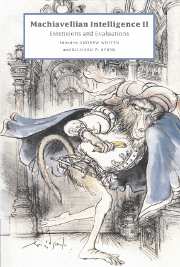Book contents
- Frontmatter
- Contents
- Contributors
- Preface
- 1 Machiavellian intelligence
- 2 Friendships, alliances, reciprocity and repair
- 3 Why Machiavellian intelligence may not be Machiavellian
- 4 Social intelligence and success: Don't be too clever in order to be smart
- 5 Minding the behaviour of deception
- 6 The Machiavellian mindreader
- 7 Exploiting the expertise of others
- 8 Primates' knowledge of their natural habitat: As indicated in foraging
- 9 Evolution of the social brain
- 10 The modulatory of social intelligence
- 11 The Technical Intelligence hypothesis: An additional evolutionary stimulus to intelligence?
- 12 Protean primates: The evolution of adaptive unpredictability in competition and courtship
- 13 Egalitarian behaviour and the evolution of political intelligence
- 14 Social intelligence and language: Another Rubicon
- Index
1 - Machiavellian intelligence
Published online by Cambridge University Press: 23 November 2009
- Frontmatter
- Contents
- Contributors
- Preface
- 1 Machiavellian intelligence
- 2 Friendships, alliances, reciprocity and repair
- 3 Why Machiavellian intelligence may not be Machiavellian
- 4 Social intelligence and success: Don't be too clever in order to be smart
- 5 Minding the behaviour of deception
- 6 The Machiavellian mindreader
- 7 Exploiting the expertise of others
- 8 Primates' knowledge of their natural habitat: As indicated in foraging
- 9 Evolution of the social brain
- 10 The modulatory of social intelligence
- 11 The Technical Intelligence hypothesis: An additional evolutionary stimulus to intelligence?
- 12 Protean primates: The evolution of adaptive unpredictability in competition and courtship
- 13 Egalitarian behaviour and the evolution of political intelligence
- 14 Social intelligence and language: Another Rubicon
- Index
Summary
After a very slow germination in the more than 20 years leading up to 1988, the ‘Machiavellian intelligence hypothesis’ has subsequently been evoked as an explanatory theory in a wide range of contexts: neurophysiology (Brothers, 1990), social anthropology (Goody, 1995), medicine (Crow, 1993) and even news broadcasting (Venables, 1993), in addition to its impact on psychology and studies of primate evolution. All of a sudden, the idea that intelligence began in social manipulation, deceit and cunning co-operation seems to explain everything we had always puzzled about. This popularity may, of course, simply reflect its correctness. However, the vagueness of the theory may also have helped, allowing it to be ‘all things to all men’. The book that brought in the name did not even contain a single, clear definition of the Machiavellian intelligence hypothesis (Byrne & Whiten, 1988a)! This was not simply carelessness, but a reflection of the reality. In many ways, ‘Machiavellian intelligence’ is better seen, not as a precise theory, but as a banner for a cluster of hypotheses that have been under active investigation since before we coined the label.
All these hypotheses share one thing: the implication that possession of the cognitive capability we call ‘intelligence’ is linked with social living and the problems of complexity it can pose. In the mid-1980s, we thought we could discern a rise in the number of studies that acknowledged the potential explanatory power of the hypothesis. However, these were often rather disparate strands: the time, we felt, was ripe for an attempt to orchestrate them into what we hoped would be the beginnings of a more coherent and focused appraisal.
Information
- Type
- Chapter
- Information
- Machiavellian Intelligence IIExtensions and Evaluations, pp. 1 - 23Publisher: Cambridge University PressPrint publication year: 1997
Accessibility standard: Unknown
Why this information is here
This section outlines the accessibility features of this content - including support for screen readers, full keyboard navigation and high-contrast display options. This may not be relevant for you.Accessibility Information
- 38
- Cited by
